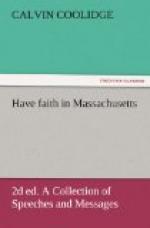XL
WILLIAMS COLLEGE
OCTOBER 17, 1919
There speaks here with the voice of immortality one who loved Massachusetts. On every side arise monuments to that enduring affection bred not of benefits received but of services rendered, of sacrifices made, that the province of Massachusetts Bay might live enlightened and secure. A bit of parchment has filled libraries. A few hundred dollars has enriched generations. The spirit of a single liberty-loving soldier has raised up a host that has shaken the earth with its martial tread, laying low the hills but exalting the valleys. Here Colonel Ephraim Williams still executes his will, still disposes of his patrimony, still leads the soldiers of the free to an enduring victory, and with a power greater than the sword stands guard on the frontier marches of the Commonwealth.
Honor compels that honor be recognized. In compliance with that requirement this day has been set apart by this institution of letters in testimony of the merit of her sons. Nearly one half of her living alumni were under the direct service of the Nation in the great war. Into all branches of the service, civil and military, they went from the alumni, from the class rooms, from the faculty, up to President Garfield himself, who served as Director of the Fuel Administration. From America and her allies has come the highest of recognition, conferred by citation, awards, and decorations. Their individual deeds of valor I shall not relate. They are known to all. Advisedly I say that they have not been surpassed among men. Their heroism was no less heroic because it was unconscious there or because of befitting modesty it is unostentatious here. There was yet a courage unequaled by the most momentous dangers which were met by those now marked with fame and a capacity in the others which would have matched equal events with equal fortitude. In the most grateful recognition of all this, to the living and the dead, by their Alma Mater the Commonwealth of Massachusetts reverently joins.
But this day, if it is truly to represent the spirit of this college, means more than a glorification of the past. It was by a stern determination to discharge the duties of the present that Ephraim Williams provided for a future filled with a glory that must not yet be termed complete. His thoughts were not on himself nor on material things. Had he chosen to inscribe his name upon a monument of granite or of bronze it would have gone the way of all the earth. Enlightening the soul of his fellow man he made his mark which all eternity cannot erase. A soldier, he did not
“put
his trust
In reeking tube and iron shard”
to save his countrymen, but like Solomon chose first knowledge and wisdom and to his choice has likewise been added a splendor of material prosperity.




